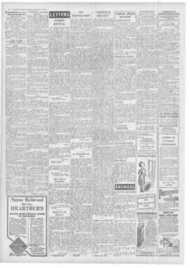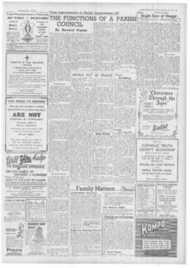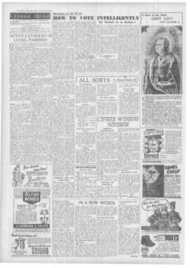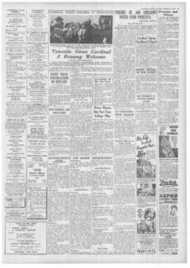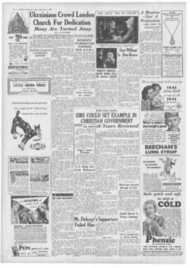Page 3, 10th December 1948
Page 3

Report an error
Noticed an error on this page?If you've noticed an error in this article please click here to report it.
Tags
Share
Related articles
The Best Book On Dostoievsky
Poor Andre Gide . .
Faith In Basic Strength Of Human Nature
Andre Gide
Roots Of The Troubles
NOVELS OUT OF FRANCE
Joy. By Georges Bernanos. (The Bodley Head, 9s. 6d.).
The Plague. By Albert Camus. (Hamilton, 9s. bd.).
Strait is the Gate. By Andre Gide. (Seeker & Warburg. 7s. 6d.). Michael. By Owen Francis Dudley.
(Longmans, 9s. 6d.).
Reviewed by W. J. IGOE IN recent excellent studies of M. Georges Bernanos, Mr. Frank McMillan and a contributor to the Times Literary Supplement have indicated the prophetic note which recurs in his writings and the feeling they give the reader of an apocalyptic visionary trying to find in the medium of the novel a means of making men see the infinite immensity of Christendom
in time and eternity. Accepting these views, it is with some diffidence that the student of novels approaches even the least of the works of Bernanos. The first duty of the artist, as such, is to master his material; but Bernanos was not
primarily an artist. He was like Bloy, a voice crying in the wilderness. Ordinary standards are not to be applied to him. In the obscurities of his work we search for light on life. And we find it.
Joy is one of his earlier books and one of the least complex. It will serve admirably as an introduction
to the others. His theme is sanctity and the enemies that pursue it to the Cross. His characters arc chosen to symbolise the temptations that surround the saint. His setting is a country house in France.
The condition of Europe is, by allegory, the theme of M. Albert Camus's fine novel which has been excellently translated by Mr. Stuart Gilbert. 'The influence of Defoe and Kafka, the detached ghostly objectivity of the latter, emerge clearly throughout the book. La Peale comes quickly to Oran, after the rats come out from their own underground city to die in the streets. The newspapers are full of the disaster that has come upon the rodents. Then men commence to die and the newspapers now had nothing to say. for rats die in the street: men in their homes, and newspapers are concerned only with the street." The city is cut off from the world outside: its life going on, it becomes at once a symbol, in itself, of modern mass man, yet remains the city. the battleground of men. Dr. Rieux, the man of science and charity. sustained only by an atavistic belief in man's worth and goodness, Tarrou. the political visionary-who wants to be a saint without God Collard, who welcomes the plague because it postpones retribution for other miss deeds, the gentle, loving clerk and frustrated poet, Joseph Grand. and the priest, Fr. Paneloux, are used like a variety of beams of light which arc focused into the squirming hive that is the dying town.
The Plague is a book all adult Catholics should read. It is a fine work of art and it presents the problem of our times; " that a ioveievs world is a dead world, and aways there comes an hour when one is weary of prisons, of one's work and of devotion to duty. and all one craves for is a loved face. the warmth and wonder of a loving heart."
The collected works of M. Gide are in course of publication from Messrs. Seeker & Warburg. Strait is the Gate is recommended to students of the novel. Beautifully written and translated. it is an interesting example of the pre-occupations of the European artist hefore the storms of 1914 swept him from his ivory tower. Gide is pleasantly anachronistic, unpleasantly egotistic and a master craftsman. He should be read by the student.
More broadly treated, the problem of pain in the world is the subject of Fr. Owen Dudley's hook. The central character tries to escape from sin in society, and pain in the world, by taking ship from England, Obsessed by his problem, he lays it before Fr. Thornton, the masterful monk, who gently breaks down the young man's -morbid reticence, and uses events that cure him of a sensitiveness that borders on the psycopathic.
Despite a style that is often irritatingly arch. Fr. Dudley creates characters with wit and sees them with an eye that notes the absurdities of contemporary fashion, in speech, garb and manners. Michael is a good story and those who admire the masterful monk will not be disappointed by it.
blog comments powered by Disqus



